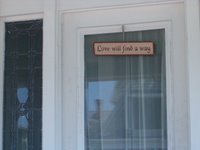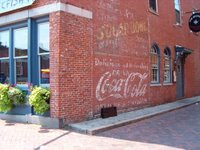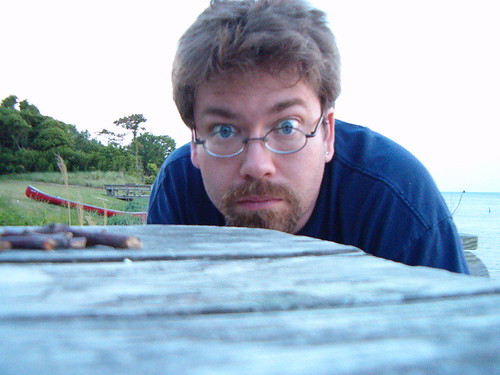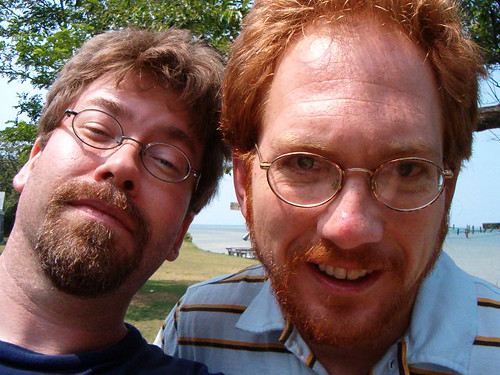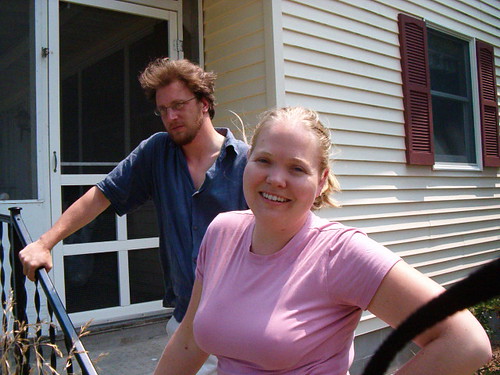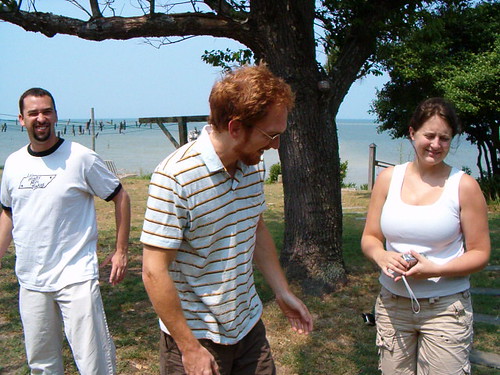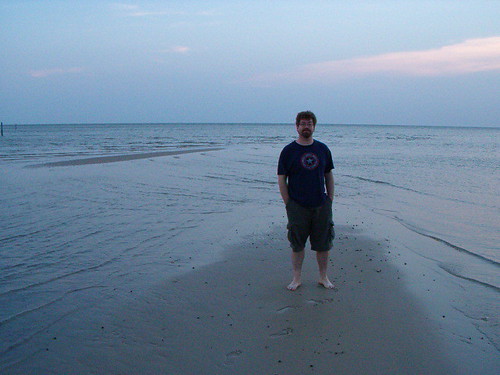The following is an article which I wrote which appears in the December 2006 issue of Nashville Arts Magazine.It happened 25 years ago in
Chattanooga.
Ten years ago it swept
Atlanta.
As I look around
Nashville, I want to ask, “Is it happening here?”
In other words, is the
Nashville art scene on the brink of a convergence of grassroots and civic forces that might make the arts—all the arts, and not merely the musical ones—a permanent and prominent factor in city life?
“There’s a real optimism in
Nashville right now,” says Herb Williams, who has become known in the
Nashville art world both for his colorful crayon art and his very visible studio space above the Arts Company downtown.
“There’s a real sense that this can work and it can happen.
For the first time we have beautiful galleries and amazing art all in one block [along
Fifth Avenue].
That’s never happened here before.”
In the mid-1990’s
Atlanta was the center of a similar groundswell, a mixture of known ateliers and a sudden explosion of small art galleries and studios.
Many of these were the result of determined efforts by cooperative groups of local semi-professional and amateur artists.
Some of these groups (like the now-legendary Mattress Factory projects, the Light Monkeys, the Ballroom Studios, the BlueMilk group, and the West Hill Concept Union—a group of which I was a member) flourished for a few years, then struggled, then folded.
By the turn of the new century a very few—the Eyedrum gallery and performance space and the YoungBlood gallery, in particular—had found a way to ‘make it work,’ and are still in operation today.
“I think a tremendous impetus for the energy these galleries had was the 1996 Olympics,” says Robert Cheatham, now Eyedrum’s executive director. “A much wider range of demographics came into
Atlanta, with a concomitant lowering of the average age.
I think the reason the ball kept rolling is because of the huge swell of population into the city and all the development in housing that came in the wake of the Games.
That was a double edged sword, for sure, but it helped ensure there were a lot of young people, and they were the ones interested in what we were doing.
They were the crowd that came to everyone’s openings, and not just ours.”
What the Olympics brought to
Atlanta as well was the brief taste of what it was like to be a '24 hour' city.
Cultural events occurred at all hours of the day and night, and they were affordable, and many absolutely free.
Artists, musicians, and performers from across the nation and the world were suddenly everywhere in the city, and the atmosphere drew local artists out from their individual efforts and got them thinking about cooperative possibilities.
Tom Wegrzynowski, who is now finishing his MFA in painting at the
University of Alabama, joined the West Hill Concept Union in 1998, after it had been in operation for two years.
He considers this to be a defining moment in his development as an artist.
“While I had my own studio practice, I was largely isolated from other artists at the time,” he says.
“I consider joining the Concept Union to be the beginning of my
professional art career. In that way I would say that involvement with an art collective was very influential in the development of my work.”
During these years it was not unheard of that Nashville-based artists would leave for
Atlanta and not return, seeing vitality there that did not seem to exist here in the eighties and nineties.
Allen Welty-Green was the director & composer of the Mind's Eye performance group - a multi-media company that produced many events in
Nashville and across the southeast between 1986 and 1992.
“We held the first event produced at the Darkhorse Theater.
It was still an open church sanctuary at the time. We hung the lights and gave the walls their first coat of black paint. When Mind's Eye dissolved, I was unable to find the resources in
Nashville to continue producing art in the same capacity, so I moved to
Atlanta, where I already had a number of connections.”
Now a member of the Eyedrum board of directors, Welty-Green has continued to produce dance and performance pieces since his move.
But
Atlanta’s underground art scene has a very different face now than it had in those early days just after the Olympics.
The energy and spark has faded in many ways, and this fact is noted and lamented by those who have been watching for the last three decades.
One such observer is Jerry Cullum, a senior editor at ArtPapers magazine, based in
Atlanta.
“What I see now is that scene is splintering between a few remaining groups.
There is some crossover and communication from Eyedrum to the YoungBlood gallery, and some crossover in a minor way from YoungBlood to a new gallery named Beep Beep.
But I wish there were more.”
In many ways
Atlanta is an example of what results when a groundswell of artistic energy explodes without a concerted civic effort to nurture and sustain it.
“At YoungBlood we’ve been lucky to have a lot of support from local businesses, and we went to local colleges and found folks willing to work for us as interns,” says Kelley Teasley, who co-founded the gallery with Maggie White in 1997, “But it takes a lot of patience and we both have had to have other jobs to get by.”
What seems to have hurt the
Atlanta art scene the most in the years since the Millennium is that the efforts have remained
too grassroots, without widespread and concerted support on the part of the city government.
Contrasts to this ‘hands off’ civic approach exist within a few hours’ drive in either direction from
Nashville.
Both
Chattanooga and
Paducah are high-profile examples of what can be accomplished when a city chooses to support and foster the arts on a community-wide scale.
Twenty-five years ago it was exactly this sort of vision for the revitalization of
Chattanooga’s downtown area that helped support the now very-successful Bluff View arts district, which boasts museums, studios and galleries just a few minutes’ walk from the Tennessee Aquarium and the city’s urban center.
More recently,
Paducah, KY enacted a massive “Artist Relocation Program,” which offered significant economic and business incentives, including interest-free housing loans, to artists willing to move to the city and foster its cultural life.
The city also recently invested in a multi-million dollar performing arts center designed to attract musicians and performers of national caliber.
“This program is a perfect fit for the community and its goals for the future,” said Artist Relocation Program coordinator Mark Barone in a 2001 interview.
Since he spoke those words, many of those goals have been realized.
The Lowertown area of the city now boasts well-established galleries and arts activities, and
Paducah is now beginning to bank on its reputation as a cultural center in tourism revenues.
“Cities like
Paducah and
Chattanooga are really embracing artists as an economic development booster,” says Caroline Carlisle of the Twist Gallery, one of the galleries making up the now-growing collection of storefront studio-gallery spaces in the
Arcades on
Fifth Avenue. “I would love to see the powers that be realize these new visual art opportunities.
I would love to see Nashvillians value the visual arts in their city, really embrace it and support it. People have to realize that if they want urban experiences like the Avenue of the Arts and Art at the
Arcade provides, they have to support it with their pocketbooks as well as with their presence.”
All the artists I interviewed, from
Nashville and across the southeast, stressed the importance of group efforts and working collectively to achieve common goals.
Robert Cheatham encourages artists here to be self-starters, to get projects underway without waiting for anyone to give permission or even money.
Herb Williams emphatically agrees, “I remember early days at Downtown Presbyterian Church, getting a chance to work with other artists there.
We put in sweat equity and were part of the community together.
My art responded to the elements of that situation.
We need more opportunities for artists like that.”
But those opportunities may disappear if there is not an equal commitment at the level of city government to create the economic and civic support to help give the arts living, breathing viability here.
There are definitely efforts on the horizon, for example the Nashville Civic Design Center, which is a nonprofit organization founded in 2000 which seeks to foster public dialogue about the direction of Nashville’s civic space.
Public art and the support of artists have played a part in these discussions.
But there is also a history of resistance among city government officials to consideration of the kind of widespread commitment that would move us in the direction of artist-friendly cities like
Paducah and
Chattanooga.
So what will happen in
Nashville?
Since I moved here in 2002, I definitely have sensed a similar energy growing all over the city—in East Nashville, and now downtown at the level of the local galleries—to that energy I felt when I lived in
Atlanta.
But I also am worried that some of the same civic difficulties that kept
Atlanta from becoming a truly arts-and-artist-friendly city may be in effect here.
The pieces are in place, and the choices that are made in the very near future will determine the cultural community and reputation
Nashville will have for years to come.
As artists and patrons, we are truly here at a portentous time.
“We’ve got the momentum, the people, and the galleries all around town moving forward like never before,” Herb Williams says, summing it all up for me.
“It’s now or never.”
Categories: culture
 So the other night I made a pilgrimage, of sorts, and ran a bittersweet errand. I went to Nashville Used Musical Instruments and sold off the first "real" instrument I ever owned, my ancient Korg Poly-800 synthesizer.
So the other night I made a pilgrimage, of sorts, and ran a bittersweet errand. I went to Nashville Used Musical Instruments and sold off the first "real" instrument I ever owned, my ancient Korg Poly-800 synthesizer.












